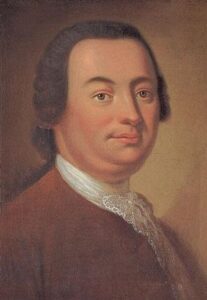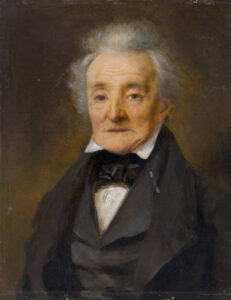The Bückeburger Bach
In Sanssouci, the name Bach pops up regularly. Not Johann Sebastian Bach, as he is part of the Baroque period, but his sons. You do the math: he had a grand total of twenty (!) children. Ten of them died at a young age and four of the remaining ten were girls – which in the 18th century meant you had little chance of becoming a composer. Out of the six boys there, one was mentally handicapped and one died before he had started a proper career.
That leaves four Bachs – and all four became composers! Even more amazing is that his sons became really successful composers who would turn out to have a profound influence on musical history. Composers that perhaps were indebted to their father, but that also changed course radically. This is the case for Wilhelm Friedemann, Carl Philipp Emanuel and Johann Christian Bach.

Johann Christoph Friedrich Bach
Johann Christoph Friedrich Bach (1732-1795), the third of the four composing sons, on the other hand stands in the shadow of his brothers. While the others roamed all over the world (Friedemann), became composer at a mighty and rich court (Emanuel) or became incredibly wealthy by pioneering with subscriptions to concerts (Christian), Friedrich remained at the court of Bückeburg, capital of the tiny nation of Schaumburg-Lippe. To be honest: he was no genius, not like his brothers. He didn’t possess the gift of creating something entirely new and that would inspire others to follow.
Perhaps he knew this himself. He corresponded for years with both Emanuel and Christian (even after these two became estranged), keeping up to date with their innovative music and adapting his own musical style similarly.
In this episode, we listen to the Piano Concerto in E flat major in which the Bückeburger Bach applies the latest fashion. He undoubtedly played the solo in this work himself, as he was an excellent pianist from an early age. We hear a more old-fashioned side of him in his motet Wachet auf ruft uns die Stimme, which sounds very much like his father’s music (or even of the generation before him). No loss here though: the polyphonic motet was an evergreen to both church leaders and composers, a tradition well worth the keeping.

Wilhelm Friedrich Ernst Bach
In addition, we can listen to a symphony from yet another Bach: Wilhelm Friedrich Ernst Bach (1759-1845). This was the son of Johann Christoph Friedrich. Though his brothers became much more famous, Friedrich succeeded in one other thing they didn’t manage: to bring a composing Bach into the world and raise him himself. Because Wilhelm Friedrich Ernst lived a long life, he actually witnessed the revival of his grandfather’s music. A monument for Bach was revealed in Leipzig in 1843, with Schumann, Mendelssohn and the then almost 84-year-old Wilhelm in the audience. Two-and-a half years later he died, which was the end of this illustrious family of composers.
Playlist
1. Johann Christoph Friedrich Bach – Piano concerto in E flat major
2. Johann Christoph Friedrich Bach – Wachet auf ruft uns die Stimme
3. Wilhelm Friedrich Ernst Bach – Symphony in G









